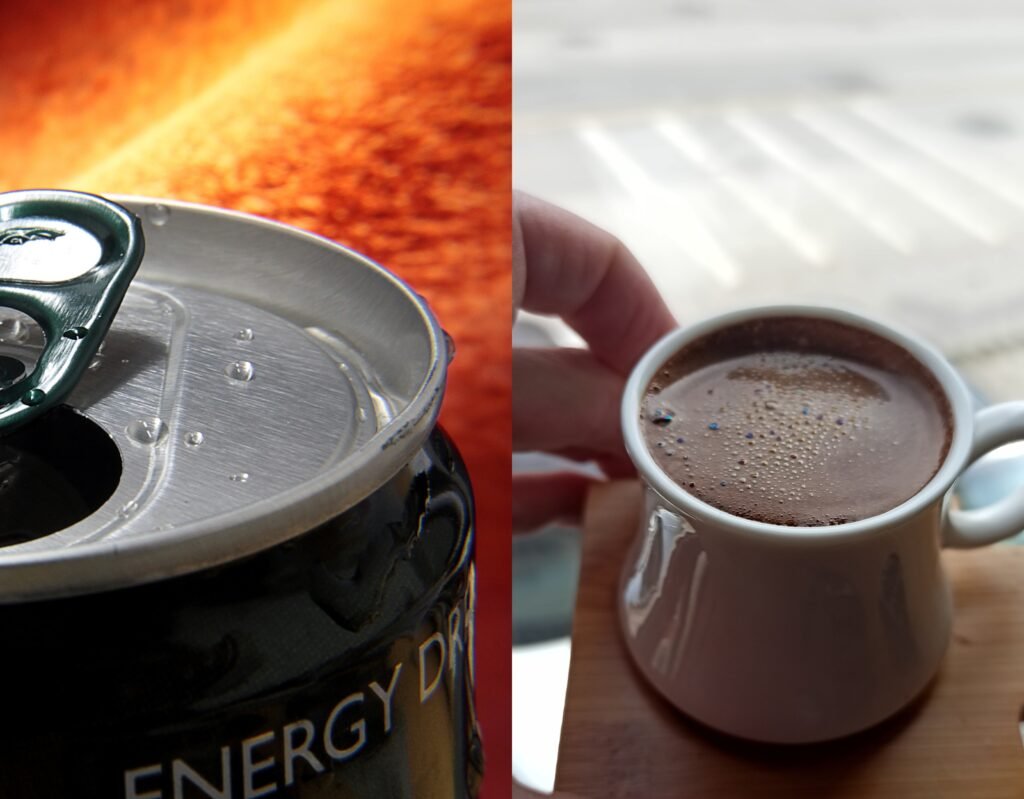Hey there, caffeine enthusiasts! Today, we’re diving into the ultimate showdown: coffee versus energy drinks. Whether you need a morning boost or an afternoon pick-me-up, choosing the right option can make all the difference. So, let’s break it down, explore their benefits, potential drawbacks, and help you decide which one deserves the spotlight in your daily routine!
Coffee in the Left Corner: The Classic Contender
1. Morning Must-Have
For many, coffee isn’t just a drink—it’s a ritual. From its soothing aroma to its bold flavor, coffee provides a comforting start to the day. Plus, it’s been a staple of cultures worldwide for centuries.
2. Health Benefits of Coffee
Rich in Antioxidants: Coffee is loaded with antioxidants, particularly polyphenols, which combat oxidative stress and inflammation. These compounds protect cells and may lower the risk of chronic illnesses like heart disease and diabetes.
Scientific Insight: Research highlights coffee’s potential in reducing oxidative stress, promoting overall health (Antioxidants, 2020).Cognitive Boost: Coffee can help keep your brain sharp. Studies link regular coffee consumption to a reduced risk of neurodegenerative diseases like Alzheimer’s and Parkinson’s.
Scientific Insight: The Journal of Alzheimer’s Disease emphasizes caffeine’s role in improving cognitive function.Metabolism Enhancer: Caffeine increases your metabolic rate, aiding in fat burning and weight management. This makes coffee a favorite for those focused on fitness.
Scientific Insight: Research in The American Journal of Clinical Nutrition shows caffeine’s effectiveness in boosting metabolism (AJCN, 1980).
Energy Drinks in the Right Corner: The Modern Challenger
1. Quick Energy Fix
Energy drinks are the ultimate on-the-go beverage, offering a mix of caffeine, taurine, and B-vitamins for a rapid energy boost. Perfect for students, professionals, or anyone facing a demanding schedule.
2. Key Ingredients and Their Effects
High Caffeine Levels: Energy drinks often pack more caffeine than coffee, delivering an immediate jolt. However, excessive caffeine can lead to jitteriness, anxiety, or even heart palpitations.
Scientific Insight: Studies highlight the risks of high caffeine consumption from energy drinks (Drug and Alcohol Dependence, 2009).Taurine and B-Vitamins: While taurine may enhance mental focus and exercise performance, its long-term effects are less understood. B-vitamins support energy metabolism but are often present in excess quantities.
Scientific Insight: Research on taurine and B-vitamins suggests benefits, but with caution regarding overconsumption (Amino Acids, 2014).Guarana Extract: This plant-based stimulant can amplify the caffeine content in energy drinks, potentially leading to health risks like elevated heart rate and blood pressure.
Scientific Insight: Studies link guarana to both enhanced alertness and increased cardiovascular strain (Journal of the American Pharmacists Association, 2008).
Pros and Cons of Each Caffeine Champion
Coffee: Pros
- Natural and Nutrient-Rich: Coffee is a natural source of antioxidants with fewer artificial additives.
- Customizable Flavor: From black coffee to lattes, you can enjoy it however you like.
- Lower Risk Profile: Moderate coffee consumption is generally considered safe for most people.
Coffee: Cons
- Bitter Taste for Some: Not everyone enjoys the natural bitterness of coffee.
- Potential for Overconsumption: Too much caffeine can lead to insomnia or irritability.
Energy Drinks: Pros
- Convenient Packaging: Easy to grab and consume anytime, anywhere.
- Rapid Energy Boost: Ideal for short-term alertness during intense work or study sessions.
Energy Drinks: Cons
- High Sugar Content: Many energy drinks contain added sugars, which can contribute to weight gain and energy crashes.
- Artificial Additives: Preservatives and flavorings may pose long-term health concerns.
- Higher Dependency Risk: Excessive consumption can lead to caffeine dependency and withdrawal symptoms.
Which One Should You Choose?
Why Coffee Wins
Coffee is an excellent choice for daily consumption, offering numerous health benefits when consumed in moderation. It’s versatile, natural, and has a more stable energy release compared to energy drinks.
When to Opt for Energy Drinks
Energy drinks are best reserved for occasional use, like pulling an all-nighter or powering through a tough workout. Look for options with lower sugar and caffeine content to minimize health risks.
Expert Opinions
- Dr. John Smith, Nutritionist: “Coffee offers long-term health benefits when consumed in moderation. Energy drinks, on the other hand, should be approached cautiously due to their high caffeine and sugar levels.”
- Dr. Jane Doe, Sports Medicine Specialist: “While energy drinks may provide a short-term performance boost, coffee is the safer choice for sustained energy and overall health.”
Related Reads for You
Final Thoughts: Sip Wisely, Stay Energized
Whether you’re a loyal coffee drinker or an occasional energy drink enthusiast, the key lies in moderation. Both beverages can fit into your lifestyle—just be mindful of their caffeine content and added ingredients. So, brew that perfect cup of coffee or crack open your favorite energy drink, and enjoy the energy boost responsibly!
References
- Salazar-Martinez, E., et al. (2004). Coffee consumption and risk of type 2 diabetes: A systematic review. JAMA, 294(1), 97-104.
- Freedman, N. D., et al. (2012). Association of coffee drinking with total and cause-specific mortality. New England Journal of Medicine, 366(20), 1891-1904.
- Seifert, S. M., et al. (2011). Health effects of energy drinks on children, adolescents, and young adults. Pediatrics, 127(3), 511-528.



